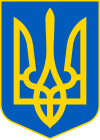Political party in Ukraine
For United Ukraine! (Ukrainian : «За Єдину Україну!» , romanized : Za Yedynu Ukrayinu! Ukraine founded in December 2001 to participate in the parliamentary election held on 31 March 2002.
History
In the parliamentary election, the party was supportive of authoritarian,[ 4] [ 5] President Leonid Kuchma , and opposed to the pro-democratic Our Ukraine–People's Self-Defense Bloc .[ 6] Radio Free Europe/Radio Liberty as a "party of power", including oligarchs, bureaucrats, and pro-Kuchma politicians, as an attempt to further increase Kuchma's power through constitutional and extra-constitutional means.[ 2] [ 7] Communist Party of Ukraine .[ 8] [ 9] Donetsk Oblast .[ 10]
The alliance consisted of the 5 following members:[ 11] [ 12]
Party of Regions (Ukrainian : Партія регіонів , romanized : Partiia rehioniv [ 13] Volodymyr Semynozhenko .Agrarian Party of Ukraine (Ukrainian: Аграрна партія України , romanized: Ahrarna partiia Ukrayiny Lviv Oblast Mykhailo Hladiy.[ 11] Party of Industrialists and Entrepreneurs of Ukraine (Ukrainian: Партія промисловців i підприємців України , romanized: Partiya promyslovtsiv i pidpryiemtsiv Ukrayiny [ 14] Anatoliy Kinakh .[ 11] People's Democratic Party (Ukrainian: Народно-демократична партія , romanized: Narodno-demokratychna partiia [ 15] Prime Minister Valeriy Pustovoitenko .[ 11] Labour Ukraine (Ukrainian: Трудова Україна , romanized: Trudova Ukrayina [ 16] Serhiy Tyhypko .[ 11] Top-10 party list: Volodymyr Lytvyn (non-partisan), Anatoliy Kinakh (Party of Industrialists and Entrepreneurs of Ukraine ), Kateryna Vashchuk (Agrarian Party of Ukraine), Volodymyr Boyko (Party of Regions ), Viktor Skopenko (Party of Industrialists and Entrepreneurs of Ukraine ), Valeriy Pustovoitenko (People's Democratic Party), Serhiy Tihipko (Labour Ukraine ), Volodymyr Semynozhenko (Party of Regions ), Mykhailo Hladiy (Agrarian Party of Ukraine), Heorhiy Kirpa (non-partisan).[ 17]
Since the election
The electoral bloc disintegrated in June 2002, following the 2002 Ukrainian parliamentary election.[ 18]
See also
References
^ "Leaders of the "Za Yedynu Ukrayinu" bloc" . Za Yediny Ukrayinu! (in Ukrainian). 2002-11-24. Archived from the original on 2004-12-08. Retrieved 2008-02-25 .^ a b "Чим є блок "За єдину Україну", який посів третє місце на виборах у загальнодержавному окрузі і має шанси сформувати найбільшу фракцію у парламенті за рахунок депутатів від мажоритарних округів?" [What is the "For United Ukraine" bloc, which took third place in the elections in the state-wide district and has a chance to form the largest faction in the parliament at the expense of deputies from the majority districts?]. Radio Free Europe/Radio Liberty . Retrieved 16 July 2022 .^ Ocheretiana, Mariia; Zabolotnyi, Nazar (26 August 2021). "Carried away by authoritarianism. Lessons of the second term of Kuchma" . Centre of United Actions . Retrieved 2 June 2022 . ^ Kuzio, Taras (June 2005). "Regime type and politics in Ukraine under Kuchma" . Communist and Post-Communist Studies . 38 (2): 167– 190. doi :10.1016/j.postcomstud.2005.03.007 – via Elsevier Science Direct. ^ Way, Lucan A. (April 2005). "Ukraine's Orange Revolution: Kuchma's Failed Authoritarianism" . Journal of Democracy . 16 (2): 131– 45. doi :10.1353/jod.2005.0037 . S2CID 154821116 – via ResearchGate. ^ "Чи перетворяться блоки "Наша Україна" і "За єдину Україну" на єдині потужні партії?" [Will blocs "Our Ukraine" and "For United Ukraine" become powerful parties?]. Radio Free Europe/Radio Liberty . Retrieved 16 July 2022 .^ (in Ukrainian) Політична партія „Трудова Україна“ , Database DATA^ " ["Our Ukraine" leads in 14 oblasts, KPU in 10, "For United Ukraine" bloc in 2. Why these results?]. Ukrayinska Pravda . Retrieved 16 July 2022 .^ Ukraine's election frontrunners , BBC News (28 March 2002)^ State Building in Ukraine: The Ukrainian parliament, 1990-2003 (BASEES/Routledge Series on Russian and East European Studies) by Sarah Whitmore , Routledge , 2004, ISBN 0415331951 /ISBN 978-0415331951 ^ a b c d e Communist and Post-Communist Parties in Europe , Vandenhoeck & Ruprecht , 2008, ISBN 3-525-36912-3 (page 391)^ (in Ukrainian) 2002 Виборчий блок політичних партій "За Єдину Україну!" , Database DATA^ "Official informational server" . Party of Regions the original on 2011-02-15. Retrieved 2008-02-24 .^ "Party of Industrialists and Entrepreneurs of Ukraine (PIEU)" . Party of Industrialists and Entrepreneurs of Ukraine the original on 2008-12-16. Retrieved 2008-02-24 .^ "Official website of the People's Democratic Party" . People's Democratic Party the original on 1998-11-11. Retrieved 2008-02-24 .^ "Informational portal TRUD.org.ua (now defunct)" . Labour Ukraine the original on 2006-06-12. Retrieved 2008-02-24 .^ Meet the "Eda" faction. 150 deputies (Знакомьтесь, фракция "еды". 150 депутатов) . Ukrayinska Pravda . 4 April 2002^ Democratic Breakthroughs and Revolutions in Five Post-Communist Countries: Comparative Perspectives on the Fourth Wave Archived 2012-10-04 at the Wayback Machine by Taras Kuzio , University of Toronto
External links
Official factions Parliamentary groups Parties without Parties with Other parties Banned

